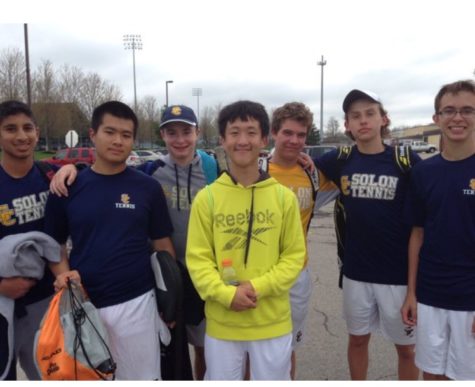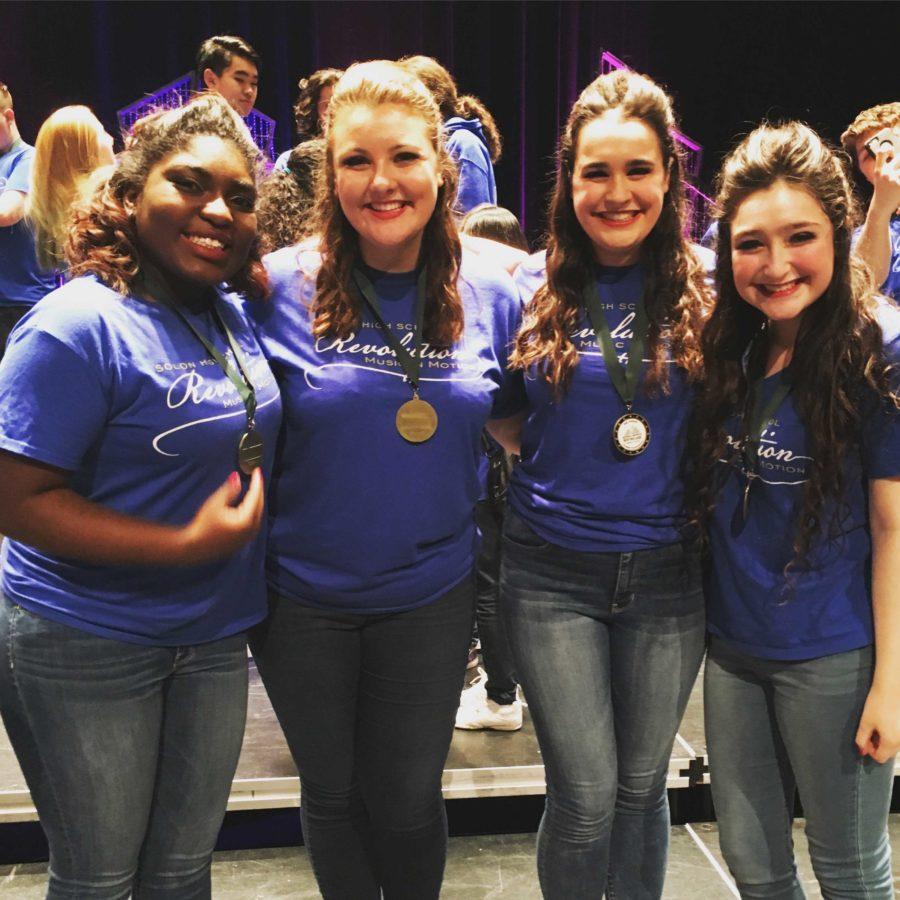Perspectives: Rivalries
March 9, 2017
Rivalries distract from purpose of competitive performance groups
MIM members (from left) Kennedy Brooks, Michelle Kramarovsky, Meredith Maiorana, and Sydney Klein after their sweep at the Medina Midwest Showcase 2017.
Beat Dirtyburg. Smash Strongsville. Mangle Mentor. These types of posters line the hallways of Solon High School leading up to big athletic matchups. I’ve never been a big school sports fan, and generally ignore these important games, but when it comes to Music in Motion, rivalries are huge to me.
Music in Motion, the SHS show choir, is a highly competitive group, and with that comes rivalries with other choirs. MIM’s biggest rival is Twinsburg Great Expectations. I’ve competed with Twinsburg twice in my high school career, and both times MIM emerged victorious. As great as these victories felt, I believe they caused more negative energy than positive. Students were far too focused on who our opponent was, instead of being focused on performing the show to the best of their ability.
First year singer/dancer and SHS senior Sydney Klein said she feels that the Twinsburg rivalry is especially heightened this year due to both groups participating in the Medina and Wheaton-Warrenville South competitions.
“I think most of MIM would agree that Twinsburg is one of our biggest rivals,” Klein said. “Especially this year since we’re going up against them twice and haven’t gone head to head in a few years. I think it’s kind of a silly rivalry, but it does exist.”
In show choir and other competitive performance groups, students are generally very supportive of each other. When I’m at a competition, I like to make friends with kids from other schools and go support as many other choirs as possible. I’ve found that victories are sweeter when the losing groups walk out the building feeling like you were classy and respectful. Similarly, losses aren’t as hard when the winning choir is kind and deserving.
For some students, like MIM Webmaster and three year member Sam Novak, strong rivalries with competitors cause them to work harder.
“I think these rivalries push the students to be the best we can possibly be,” Novak said. “I know that it totally motivates me to be the best I can be. Like football, we obviously want to beat the other group/team by as much as possible, but even the slightest victory feels just as sweet.”
However, in my personal experience, rivalries bring up a lot of negative energy, anger, and resentment. When we compete with Twinsburg, MIM students tend to focus more on what will help us beat them, not in what will make the show the most entertaining or what will help us live up to our full potential.
Rivalries take the focus away from the task at hand. Students are more focused on the behavior and actions of the other team instead of their own show. However, I can only speak for artistic competition. I’ve never been on a competitive sports team where schools compete head to head, and the other team’s actions directly affect your game. In show choir, you can’t control the other groups performance, there is no defense. You can only control how well you execute the plan of your show, and just do the best you can, so having a nasty relationship with another choir is relatively pointless in my mind.
I think that everyone in the show choir community would have a better experience if negative rivalries didn’t form, and in my personal experience that is totally possible. MIM has gone up against Findlay First Edition many times while I’ve been a member, and both groups have come up on top, similar to MIM’s history with Twinsburg. What is different in our relationship with Findlay is the way that each choir treats the other. Findlay students personally came up to me and congratulated me when we were named Grand Champions over them at the 2017 Medina Midwest Showcase, and we were thrilled that they emerged victorious at the competition we host, the Solon Show Choir Invitational. With a mutual respect between the choirs, everyone has a more enjoyable time competing, whether you win or lose.
In all artistic endeavors, everyone wants to be entertained, and in show choir, that means everyone doing their best. Wishing other choirs ill, and being rude to them or avoiding them all together isn’t going to give anyone the result they want.
In the end, I think that rivalries can be a positive things for competitive performance groups, but more times than not, rivalries can turn ugly, and distract students from what’s most important, the performance. Everything else should be secondary in students’ minds, and in the words of MIM director Gary Lewis, students must “keep the main thing the main thing.”
Rivalries make high school sports competitive and meaningful
Rivalries exist in all levels of sports. In the NBA, the Golden State Warriors and Cleveland Cavaliers are poised for a third consecutive matchup in the NBA Finals. In college football, Ohio State and Michigan are regarded as the two most historic rivals in the sport’s existence. Even at the high school level, Solon sports teams consider certain schools as rivals in the newly established Greater Cleveland Conference. These rivalries enhance competition and push student-athletes to compete at their hardest.
Courtney Dunn, who plays softball for SHS, said she understands that rivalries motivate her team to rise to the occasion no matter who they face.
“The softball team takes rivalries seriously in that we always want to go out and play our best,” Dunn “We don’t only take our rivalries seriously, we also focus on the other really good teams in our conference.”
Contrary to pop culture, high school sports rivalries in 2017 don’t usually consist of a heist of a school mascot, or out-of-school confrontations like those seen in “Karate Kid.” In my experience as a student-athlete at Solon, rivalries with other schools are civil, meaningful and contained within the actual sporting event.
I have been a varsity tennis player at Solon for all of my high school career. Our team usually carries a similar schedule from year to year, so we know most of our opponents very well at the beginning of each season. When we receive our schedule in the offseason, we highlight opponents that have beaten us in the past, or matches that are of particular importance. In a sense, we constantly acknowledge where our rivals are.

The 2016 Solon boys tennis team.
As a team, we identify rivals in order to measure ourselves. Our team prioritizes matchups with our rivals because they serve as benchmarks for evaluating our progress as a whole. If we can beat teams that we know are talented, we can ensure that our team’s lineup is at its strongest. By placing special attention on these opponents, we give our team even more of an incentive to beat them.
Our team also prioritizes certain matches for a source of motivation. Frankly, my teammates and I train in the offseason so that we can beat top teams. If we didn’t have teams that we know we need to beat, there would be no reason to put effort into what we do.
Football player Logan Rock can also explain how the presence of rivalries for his team pushes them to work hard.
“The football team prepares every week like it is rivalry week,” Rock said. “But when it actually is rivalry week, it just gives us more motivation to win and practice harder.”
However, the high stress of intense high school sports competition can lead to negative responses from student-athletes. Despite the many benefits of quality competition in sports, there always is potential that a student-athlete could act out of line due to the sheer competitiveness of high-level high school sports. This could entail unsportsmanlike behavior during a game, or inappropriate comments directed towards an opponent. However, the state of Ohio has mandated rules that are designed to prevent this sort of behavior. If a student-athlete truly wants to break the code of conduct and act out, swift punishment will definitely follow. Because of these rules, there is no incentive for a student-athlete to disrespect his or her opponent.
Additionally, if a rivalry in high school sports turns personal, it really isn’t a true sports rivalry– It’s just disrespect for one another. A true high school sports rivalry should serve only test the mettle of student-athletes and force them to compete a high level. SHS student-athletes can attest to the enhanced competition that a true high school sports rivalry provides.
“The whole world gets cut off and the team just focuses on each other and playing at our best,” said Anmol Kumar, who plays soccer and runs track for SHS. “It’s due to these rivalries that we push ourselves to do our best and perform at a level we only dream of.”
